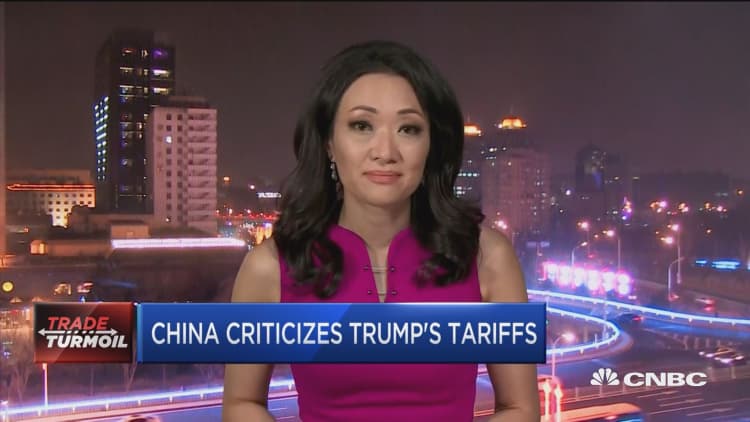International opprobrium at President Donald Trump's steel and aluminum import tariffs, announced Thursday, was swift and fierce.
Industry leaders and allied countries threatened retaliation over what they called blatantly protectionist measures.
But Asia, which produces more than two-thirds of the world's steel, will be minimally affected when compared to the rest of America's trading partners, according to ratings agency Moody's.
"In Asia, the direct economic effects at the macro level would be very small as exports of aluminum and steel to the U.S. typically amount to less than 1 percent of gross domestic product (GDP) or exports," Moody's said in a research note Friday.
It added that "the direct impact on steel companies would be manageable for the steel sector and rated steel-makers in Asia," because steel is predominantly traded within the region. "The direct impact is moderate on Korean steelmakers, to low on all the rest of Asia."
The CEO of Japanese giant Nippon Steel, the world's second-largest steel producer by volume, called Trump's decision "regrettable." Asian shares saw a selloff on Friday, led by metals producers, with South Korea's Posco down 3 percent and Nippon Steel down 4 percent.
"Even for Korea — with high levels of steel exports to the U.S. — the effects will only prove moderate for Posco and Hyundai Steel," Moody's said in a tweet Friday.

But the Moody's note maintained that the impact of broad U.S. tariffs on these imports will depend on their scope, as well as "the capacity of steel and aluminum producers to offset part of the tariff increases through cuts in costs or margins."
Canada and Bahrain to be hardest hit, China far down the list
As it stands currently, the agency predicted that Canada and Bahrain will be most affected by the tariffs.
This would appear contradictory to Trump's long-held aim of pressuring China economically for what his administration has called unfair trade practices. While China produces about half of the world's steel, it is not among the top five exporters to the U.S. It ranks number 11, according to the International Trade Administration.
The levies will instead hit American allies including Canada, South Korea and Mexico, who comprise 16, 10 and 9 percent of U.S. steel imports, respectively. More details on the tariffs, including potential exemptions, may emerge in the coming week.
Still, the measures would be "indirectly credit negative for the Asian steel industry," Moody's wrote, since a reduction in export volumes to the U.S. would make steelmakers divert their output elsewhere, "in turn intensifying competition in Asia."
Analysts predict that China is likely to hit back by raising tariffs on U.S. products that would hurt American exporters, particularly in the agricultural sector. The Chinese embassy in Washington, D.C. did not immediately respond to a CNBC request for comment.
The proposed measures, which come under Section 232 of the Trade Expansion Act of 1962, would impose a 25 percent levy on all steel imports and a 10 percent levy on aluminum imports. The U.S. currently imports 30 percent of its steel, and a longtime global supply glut has led the country's steel industry heads to call for a clampdown on foreign imports.
As part of his campaign promise to salvage long-struggling U.S. industries, Trump has defended the move as a boon to American jobs. Critics, meanwhile, say it will raise costs on downstream producers of goods that use the materials, while simultaneously risking a trade war.
In the long-term, however, tariffs on steel and aluminum "could signal a marked deterioration in global trade relations," the ratings agency warned, depending on how other countries respond and to what extent they choose to retaliate.
"While not our baseline scenario, Asia as a trade-reliant region would be vulnerable to a marked slowdown in global trade."


